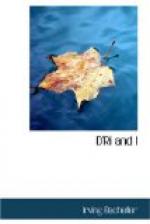“Your affectionate
“Louison.”
“She is an odd girl,” said the count, as I gave back the letter, “so full of fun, so happy, so bright, so quick—always on her tiptoes. Come, you are tired; you have ridden far in the dust. I shall make you glad to be here.”
A groom took my horse, and the count led me down a wooded slope to the lakeside. Octagonal water-houses, painted white, lay floating at anchor near us. He rowed me to one of them for a bath. Inside was a rug and a table and soap and linen. A broad panel on a side of the floor came up as I pulled a cord, showing water clear and luminous to the sandy lake-bottom. The glow of the noonday filled the lake to its shores, and in a moment I clove the sunlit depths—a rare delight after my long, hot ride.
At luncheon we talked of the war, and he made much complaint of the Northern army, as did everybody those days.
“My boy,” said he, “you should join Perry on the second lake. It is your only chance to fight, to win glory.”
He told me then of the impending battle and of Perry’s great need of men. I had read of the sea-fighting and longed for a part in it. To climb on hostile decks and fight hand to hand was a thing to my fancy. Ah, well! I was young then. At the count’s table that day I determined to go, if I could get leave.
Therese and a young Parisienne, her friend, were at luncheon with us. They bade us adieu and went away for a gallop as we took cigars. We had no sooner left the dining room than I called for my horse. Due at the Harbor that evening, I could give myself no longer to the fine hospitality of the count. In a few moments I was bounding over the road, now cool in deep forest shadows. A little way on I overtook Therese and the Parisienne. The former called to me as I passed. I drew rein, coming back and stopping beside her. The other went on at a walk.




